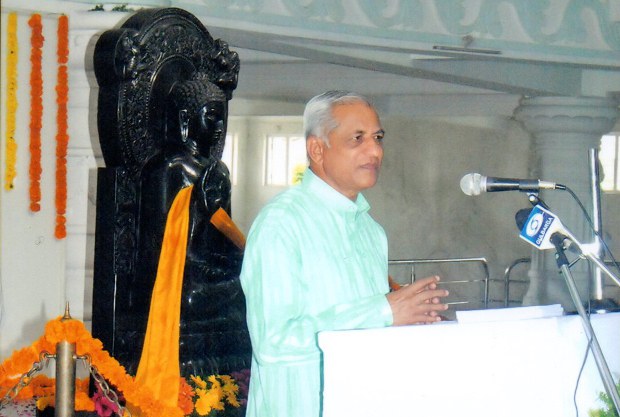India: Karnataka Police Probing Death Threat Against Writer
2015.09.10
 K.S. Bhagawan, a writer from India’s Karnataka state, has angered Hindu groups for public comments in which he criticized the Bhagavad Gita.
K.S. Bhagawan, a writer from India’s Karnataka state, has angered Hindu groups for public comments in which he criticized the Bhagavad Gita.
Less than two weeks after an eminent scholar in Karnataka was slain for allegedly expressing “anti-Hindu” views, police in the southern India state say they are investigating a death threat made against another noted local intellectual.
Writer K.S. Bhagawan on Wednesday received a threatening letter in the mail at his home in Mysore, according to a police source who sent BenarNews a facsimile of the letter.
“Don’t relax thinking you are safe. Haavina Dvesha 12 years (a snake’s revenge lasts 12 years). 3 successful. Next you. Will never miss the target. No police security will save you when we come. We know how to do. Count your days,” read the unsigned letter read, which was typed in English.
Police said they were taking the mailed threat against Bhagawan “very seriously.”
“We have intensified security outside his residence,” Mysore Inspector General of Police B.K. Singh told BenarNews on Thursday.
The threat to Bhagawan, 70, an award-winning writer in the Kannada language and a retired English professor at Mysore Maharaja’s College, came 10 days after two unidentified gunmen shot dead M.M. Kalburgi, a 77-year-old renowned academic, at his residence in Dharwad, Karnataka.
Kalburgi was one of three so-called “rationalists,” or progressive Indian thinkers, killed since 2013 for allegedly voicing “anti-Hindu” opinions.
Second threat in two weeks
Police have opened an investigation but have arrested no suspects in connection with the latest threat, Singh said. The mailed in threat was, in fact, the second one made against Bhagawan in recent days.
Just hours after Kalburgi’s murder, an activist from Bajrang Dal, an affiliate of the right-wing group Vishva Hindu Parishad (VHP), allegedly threatened Bhagawan in a message posted on Twitter for “mock(ing) Hinduism.”
The activist, Bhuvith Shetty, was arrested on Monday on charges of spreading communal hatred, but released on bail the same day.
Bhagawan earlier this year had angered fundamentalist Hindu groups with controversial remarks about the Bhagavad Gita. While the outspoken Kalburgi had provoked the wrath of such organizations by publicly denouncing idol worship, Bhagawan reportedly angered right-wingers when he threatened to burn certain pages of Hinduism’s holy scripture. As Bhagawan put it then while speaking at a public event, these demeaned women and members of lower castes.
Defiant
Despite being threatened, Bhagawan said he was “not the least bit afraid of these narrow-minded fundamentalists,” whom he declined to refer to as Hindu radicals.
“These are probably misled youth who haven’t read even a single stanza from my works. I have no sense of fear from them,” Bhagawan told BenarNews by phone from Mysore.
“With my writings, I intend to spread equality and rationalism through scientific inquiry. And if someone wants to question my work, they should do it in a civilized manner,” he said.
Among the three rationalists who were killed in separate homicides were Narendra Dabholkar, a Maharashtra state-based author and anti-superstition activist, and Govind Pansare, a left-wing politician from that state.
Dabholkar was shot dead by two motorcycle-borne assailants in Pune in August 2013. In a similar fashion, Pansare and his wife were gunned down in Maharashtra’s Kolhapur town this past February.
Indian police suspect the three homicides are linked but have yet to make a breakthrough in any of the cases.
Chandrashekhar Patil, a renowned Kannada poet and playwright, who had known Kalburgi for 55 years, described the Hindu aggression targeting free-thinking academics as “right-wing terrorism.”
“I feel a sense of deep shock and immense anger over Kalburgi’s assassination,” Patil told BenarNews.
On Monday, in protest of his friend’s slaying and the failure of police to nab any suspects behind it, Patil returned his 2009 Pampa Award, Karnataka’s highest literary honor, to the state government.
“He was brutally assassinated. And for what? For expressing his views,” he said.
“What sort of democracy is this? What are we heading toward?”







